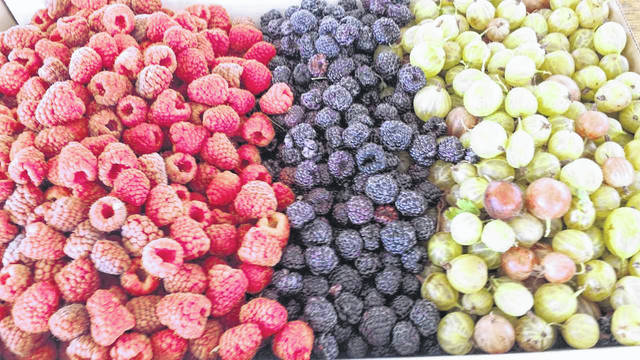Pullins to lead Ohio Produce NetworkMike and Cathy Pullins of Champaign Berry Farm in Urbana won the Value Added Product Tasting with their Black Raspberry Jam entry during the Ohio Produce Growers and Marketers Association’s annual Ohio Produce Network on Jan. 16-17 in Dublin. In this contest, growers vote for their favorite jam, salsa, jelly or specialty product. This year the Ohio Produce Network featured 56 educational sessions, a membership meeting, keynote address by Wendy’s Chief Communications Officer Liliana Esposito, a sold-out industry trade show and a few hands-on sessions.
Also at this year’s conference, Cathy was elected president of the Ohio Produce Network, where she will serve with Alex Buck of Fruit Growers Marketing Association in Newcomerstown as vice president. Cathy’s husband, Mike, served as executive director of the Ohio Produce Network during the 1990s and early 2000s. The Champaign Berry Farm began as an FFA project for Cathy and Mike’s son, Matt. The farm evolved from 5 acres in 1995 to its current 25 acres. On their farm in Mutual (village just outside of Urbana), the Pullins grow black raspberries, red raspberries, currants and gooseberries. “I see us as providing a service to the public; every year we have people saying ‘thank you for being here, thank you for doing this,’” said Cathy. Both Cathy and Mike are retired from other jobs and Cathy said farming keeps them physically fit and busy. “[We farm] to help people have good food to eat,” said Cathy, adding that there are a lot of healthy benefits to raspberries. “Any dark fruit is good for you.” “And we just love doing it. We’ll probably [farm] until we can’t,” said Cathy. Cathy worked with children with disabilities for 34 years at the Lawnview Child and Family Center in Urbana (which is now called Madison-Champaign Educational Service Center). Mike worked for the Ohio Farm Bureau for 33 years before he retired and he served as executive director of the Ohio Fruit Growers Society, Ohio Vegetable and Potato Growers. However, they farmed in addition to their jobs. They bought their first farm in the late 1970s and Cathy said that they were able to “hang on” when the 1980s Farm Crisis hit because they had other jobs. They lived in eastern Ohio until 1988, when they moved to Champaign County. In 2013, they planted a test plot of peach trees and have been growing them since. They have a total of 1,000 peach trees on their home farm on South Ludlow Road in Urbana and on the test plot in Mutual. Three weeks out of the summer, usually mid-June to mid-July (depending on the weather), they open up their farm to the public, bringing in seasonal workers. People are welcome to visit the farm and pick their own berries, or people can put in orders to have berries picked for them. More than 80 percent of Champaign Berry Farm’s raspberries are pick-your-own. According to the Pullins, more than 40 percent of the customers come from the Columbus area, some others coming from as far as Kansas, Colorado, Virginia, New York, and Florida. Champaign Berry Farm is registered with the Ohio Farm Bureau Buying Local directory and the Ohio Department of Agriculture’s Farm Markets directory. Twenty percent of their berries are sold wholesale to farmers who will then sell them at farmers markets, such as the Clark’s Farm Market in Springfield; Miami County Farmers Market in Troy; Champaign County’s Virtual Farmers Market; Logan County Farmer’s Market; and others throughout Ohio. They have jams and sauces that are made with their product, which are available year round. Mike said that their geographical location is very beneficial to them, an hour’s drive or less from Columbus, Dayton, Marysville, Bellefontaine, Delaware, Piqua, Springfield, London and other surrounding towns and cities. “We have two to three million people within 40 miles,” said Mike. Overall, the Pullins family owns and farms about 1,400 acres, including the berry farm, peach trees, corn, soybeans and hay. Some land they farm themselves, and some they lease to others. Mike and Cathy have two sons, who are both managers and investors in the family farm business. They also have a daughter, who raises livestock. Raspberry challenges Red raspberries are grown throughout the world, said Mike, but black raspberries are only native to the Midwest. Raspberries have to be picked dry because they will mold if wet, and they are difficult to grow. “[Black and red raspberries] are a very difficult crop to grow because of all of the pests and diseases,” said Mike, adding that there are more than 20 fungal diseases to which raspberries are susceptible. “Raspberries are very closely related to roses; they’re in the same family. And so any gardener who grows roses knows all the insects and diseases that attack raspberries.” Mike added that within the past 6 years, an invasive species from Asia called Drosophila suzukii, or the spotted wing Drosophila, commonly known as a fruit fly, “has attacked all soft fruits, but particularly is devastating to raspberries and black berries…and it’s very difficult to control.” “There’s a spray program that Mike follows with fungicide for the fungal diseases and then with insecticides for the SWD (spotted wing Drosophila),” said Cathy, adding that because of these obstacles it’s difficult to be organic. “People ask us all the time if we’re organic. We could not have a crop—however, we do follow recommended practices in spraying and we’re very cognizant of the bees…because we love the bees and the bees love the berries when the red raspberries are in bloom.” Most raspberries are biennial plants, which means the flowering plant takes two years to complete its biological lifecycle. In the first year, the plants grow leaves, stems and roots and enter a period of dormancy during the colder months. “The cane (stem) grows one year, overwinters, and then fruits in early summer,” said Mike. “Then that cane dies, not the plant, just that cane dies. And at the same time the cane is growing for the next year. So you have two crops always growing at the same time.” Raspberries require 2,000 hours of cold. Connect For more information about Champaign Berry Farm visit: www.champaignberryfarm.com. The Ohio Produce Growers and Marketers Association is a non-profit organization that works for the betterment of the produce industry in Ohio. For more information about the organization, visit the OPGMA website at www.opgma.org.
0 Comments
Your comment will be posted after it is approved.
Leave a Reply. |
Archives
February 2024
Categories
All
|
|
CEP Office Location:
40 Monument Square, Suite 306 Urbana, Ohio 43078 937-653-7200 |
All drone photography courtesy of Jassen Dobyns of UAVisions LLC. Additional photography courtesy of Dave Millner of the Champaign Camera Group.
Website by Berry Digital Solutions, LLC Urbana, Ohio |
Click on the logos for more information.


 RSS Feed
RSS Feed










